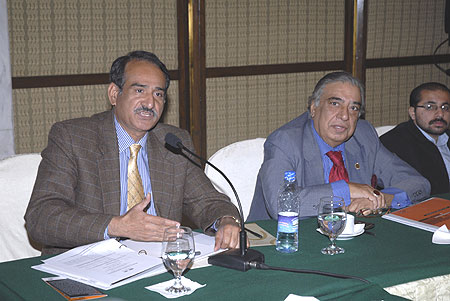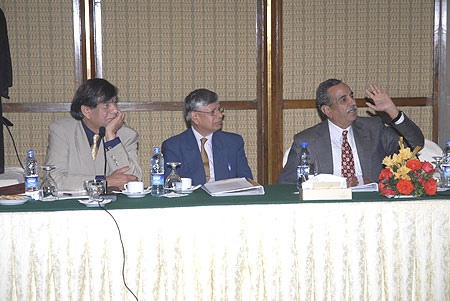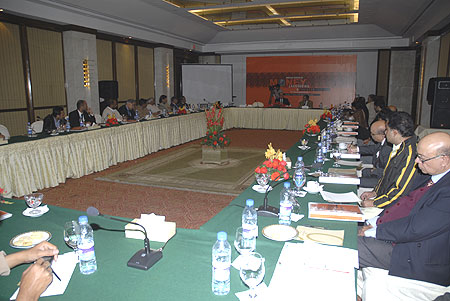|
|
| |
| EVENTS |
|
|
> Anti-Money Laundering Ordinance -2007 Analysed; Review Proposed in keeping with National and International Considerations
|
| |
|
Briefing Session
February 14, 2009
Pearl Continental Hotel, Lahore
|
|
| |
Lahore, February 14 : PILDAT organised an exclusive Briefing Session for Business Persons on Money Laundering and Pakistan today February 14, 2009 at Lahore. |
|
| |
Money laundering and its linkage to terrorism financing have become subjects of intense international interest especially after 9/11. Anti money laundering laws have, therefore, assumed a great significance in almost all countries of the world. An Anti-Money Laundering Bill remained pending with the 12th National Assembly of Pakistan (2002-2007) for over a year after which an Anti-Money Laundering Ordinance was promulgated by the President of Pakistan on September 07, 2007. Some experts argue that the Anti Money-Laundering Ordinance 2007 (AMLO 2007) does not fully meet the international standards and needs amendments. It is understood that the Government of Pakistan is currently considering possible amendments which may soon be introduced in the Parliament in the form of an amendment bill. PILDAT felt that it is important for Senior Government Officials, Media, Members of Parliament as well as all other stakeholders, to understand the significance of Anti Money Laundering Laws for Pakistan, compare Pakistani AML laws with similar laws in the region and how money laundering impacts Pakistan.
|
|
| |
The briefing by PILDAT was organized so as to provide an opportunity to the key stakeholders to understand key features, strengths and weaknesses of the current Anti-Money Laundering Ordinance-2007 and know what can be possible amendments to the law. |
|
| |
The Briefing Session for Business persons on February 14, 2009 was held at Pearl Continental Hotel Lahore and was widely participated by Business Community including representatives from prominent banks of the country and Lahore Chamber of Commerce and Industries. |
|
| |
The speakers at the PILDAT Briefing for Business Persons included Mr. Ahmer Bilal Soofi, President, Research Society for International Law and Senior Advocate at Supreme Court of Pakistan; Mr. Shahid Hamid, Senior Advocate Supreme Court and Former Governor Punjab while Mr. Ahmed Bilal Mehboob, Executive Director, PILDAT, moderated the session by delivering inaugural remarks and later moderating the briefing and the Q&A sessions. |
|
| |
In the briefing, participants were briefed about the meaning, origin and stages of money laundering and the legal placement of the current Anti Money Laundering Ordinance 2007 (AMLO 2007) in the international system. Speakers discussed the need to come up with an effective and strong Anti-Money Laundering regime in Pakistan keeping in view Pakistan�s internal concerns and considerations and to ensure health of Pakistan�s economy, security and integrity. |
|
| |
Mr. Ahmer Bilal Soofi covered the legislative aspect of the bill and spoke on how its legally binding on Pakistan through United Nations Charter under Resolution 1617 to adopt an efficient legislation against money laundering. He stressed that we need political will, sensitivity and concern on national level to prioritise revamping the existing Anti-Money Laundering Ordinance. The absence of an effective AML regime is not only parasitical for our economy but is also continuing to affect our international placement, complicate our foreign policy options and carries serious repercussions for all citizens. He said that money laundering is an emerging subject and should be studied in the context of International Law and since it overlaps both public and private international law, such a complicated subject requires extensive study and a proper legislation in place. He said that international laws like this always involve some degree of bartering individual or state sovereignty and cannot be made or regulated without international cooperation. |
|
| |
He explained the concept of predicate offense and its well-founded evidence being an essential pre-requisite to the act of money laundering. He clarified some of the legal terminologies and answered questions relating to legal ambiguities and weaknesses in the existing law. He was also of opinion that like Anti-Money Laundering Ordinance 2007, there should be a standalone Mutual Legal Assistance (MLA) Regime in Pakistan to facilitate legal cooperation in between states for of transnational crimes such as money laundering. He said that if the weaknesses in AMLO 2007 are not rectified during these upcoming amendments Pakistan may give an evidence of international �non-cooperation�. He also said that Pakistan has an option to include a provision in the amendments that can enable the country to retrieve the wealth sent abroad through money laundering upon furnishing evidence and proving that the wealth laundered was generated out of a predicate offence listed in the country�s predicate list. |
|
| |
Mr. Shahid Hamid who also authored a Briefing Paper for PILDAT on the issue, analysed the present Anti Money Laundering Ordinance 2007 in light of the Recommendations of Financial Action Task Force (FATF) and concluded that the law if fully implemented contains all the necessary provisions required of Pakistan under its international obligations. However, he said that operational and implementational details need to be streamlined and worked upon.
PILDAT especially prepared three publications on the subject: Legislative Brief on Anti Money Laundering Bill; Briefing Paper on Pakistan�s Anti-Money Laundering Legislation and a Comparative Study on Anti-Money Laundering Legislations in the Region, which were circulated among the participants during the briefing sessions. |
|
| |
|
|
| |

|
|
| |
|
|
| |

|
|
| |
|
|
| |

|
|
| |
|
|
| |

|
|
| |
|
|
| |

|
|
|
|
|
|
|
|
|